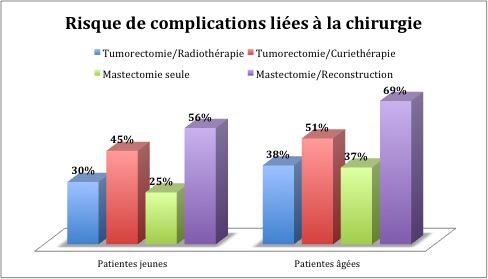In terms of complications, mastectomy followed by reconstruction explodes the counters. Alternatives, safer and less invasive, exist in breast cancer.

Conservative surgery for breast cancer is by far the most practiced in France. Right, if we are to believe two studies presented at the symposium on breast cancer, which is being held in San Antonio (Texas, United States) from December 8 to 12. One of them, carried out on American patients, shows that reconstruction just after mastectomy increases the risk of complications.
Used sparingly
For this work, the researchers analyzed the records of 44,300 young patients and 60,850 elderly patients with tumors detected at an early stage. Among the complications noted in the two years following their surgical management were local infections, hematomas, fatty necrosis, breast pain or fractures of the ribs.
Combining mastectomy and reconstruction during the same surgery doubles the risk of suffering from it.
But in France, this approach is used sparingly. “We are targeting a lot of indications for ablation and immediate breast reconstruction,” underlines Dr Séverine Alran, senologist surgeon at the Institut Curie (Paris). We are aware of the fact that we lose our natural breasts and that these surgeries can be more complicated. These indications are integrated into our decision trees. “
Dr Séverine Alran, surgeon at Institut Curie (Paris): ” 70 to 75% of women have conservative treatment. Of the women who have a mastectomy, 70% do not have breast reconstruction. “

As effective as conservative treatment
Reserving the mastectomy / reconstruction combination for the patients who present the least risk is a strategy that pays off. Compared to the United States, France has fewer complications. “Deploying it generally increases the risk of complications,” explains Séverine Alran. A patient who undergoes radiotherapy or chemotherapy after surgery will be at greater risk of prosthesis exposure, that is, she will disunite. If there are post-operative complications, this will delay chemotherapy, and therefore limit the effectiveness of the treatment. “
Dr Séverine Alran : ” It is very important to know why we have a mastectomy: is it a preventive treatment? If it’s breast cancer and you can keep the breast, there is no reason to have it removed. “
Especially since another study presented at the symposium concludes that conservative surgery does as well as mastectomy in terms of 10-year survival. A cohort of Dutch women, diagnosed at an early stage between 2000 and 2004, was followed over this period. 76.8% of those who received conservative treatment and radiation therapy were still alive after a decade, compared with 59.7% of those who received mastectomy alone.
“We found this type of results in older trials, conducted in the 1970s,” Séverine Alran analyzes. They concluded that the survival rate was identical at 10 and 20 years. This work confirms these data. “
.

















